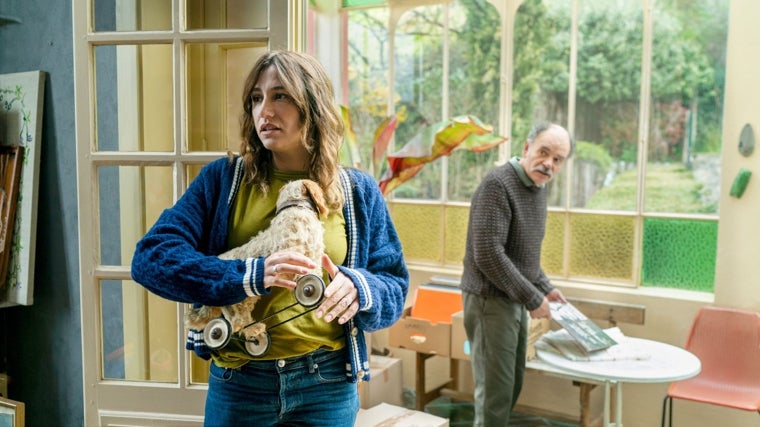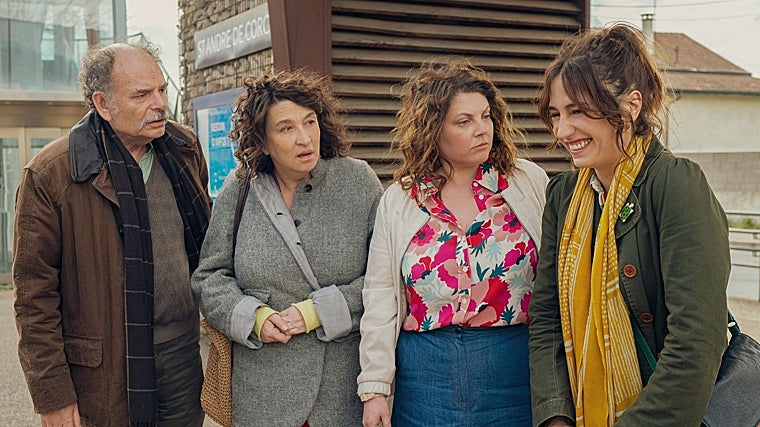Jean-Pierre Darroussin: "Cinema has the function of exerting a kind of catharsis on the viewer."

With the imminent Spanish release of the film "Juliette in Spring," actor Jean-Pierre Darroussin arrives in Madrid to chat about life, family, hardships, and the importance of discussing sensitive topics.
-How would you define 'Juliette in Spring'?
It's a very warm film; it tells stories that touch all families. It tries to explore the psychological relationships between siblings, fathers, mothers, divorces, separations... We're dealing with a family, how would I put it? A bit crazy. They're artists. The protagonist is a cartoonist, as the story is taken from the comic of the same name, and the mother wants to be a painter. Everyone makes fun of her, but she's full of desire, of life... All in a rather precarious environment, because they're not well off financially, they live in fairly humble circumstances. I'm a father and a grandfather who lives off his retirement pension, but he's also a bit of a pillar of love, the one you can always count on. He cares less about himself and more about others.
-Can we say that the film is about life, without embellishments?
Yes, it explores the environment in which a young girl has grown up and questions everything. She returns to her family, to her home, and discovers a secret that, for reasons of pain and shame, is linked to a time when families didn't talk. Nowadays, it's precisely the opposite. Psychoanalysis exists, and the idea that things should be expressed rather than left alone, settling, sedimenting, is more common. This creates increasingly indisputable layers and traumas for children and grandchildren. These problems have been passed down from generation to generation, so it's good to talk and discover the keys that can open doors, and when they are opened, the light comes in.
-You play a father who can't express everything he feels...
He jokes. It's an expression of his true feelings, because he has so many things to deal with, and he's decided to be lighter. Instead of bothering people with his own dramas, he's someone who is much more concerned about others than himself. He tries to lighten up so as not to burden others with his burdens and problems. He has this philosophy of avoiding, of distancing himself, which, in the end, is a dynamic that allows others to develop and evolve. He's decided not to take up too much time, not to put himself at the center.
-You have children, how have you brought your feelings as a father to this film?
"I think I'm a father like the one in the movie. The difference is that people recognize me on the street, so it's harder for me, let's say, to disappear. Sometimes I think it's a little complicated for my children, but they know they can count on me."
 Izïa Higelin and Jean-Pierre Darroussin in 'Juliette in Spring'
frames
Izïa Higelin and Jean-Pierre Darroussin in 'Juliette in Spring'
frames
-Do you think it's a universal story?
Yes, because it could have been written by Chekhov; he spoke of all those nuances, of what isn't said. In his literature, there are many characters written through jokes, who express themselves that way. I think there's a parallel between always making people laugh and cry, and that debate that lies within their emotions. Besides, there are many authors capable of writing about the turmoil of the human soul, think of Woody Allen or Ingmar Bergman. This is a lighthearted film, but extremely tender.
-It's a truly poetic film...
-It's true, for example, there are moments that distract attention, like a cat falling from a roof, but they allow for original connections between events and people. And poetry is there, in that gaze that allows for associations, original connections.
-Can life be chaotic and everyday at the same time?
-Well, it depends on the individual. There are people who organize their lives so that the daily routine is sufficiently scheduled and rigid, and they find their normal rhythm in life so that chaos doesn't prevail. But chaos always invites itself; it enters at the least expected moment. And that's what's poetic and interesting about life: the alternation between the chaotic, the ritual, and the everyday.
 The family starring in 'Juliette in Spring'
frame
The family starring in 'Juliette in Spring'
frame
-Do you think this film can be classified as forced inclusion?
Well, in any case, it's brave and daring for a filmmaker, for an author, to offer viewers a film about depression. You have to go through a lot of contortions to find that pleasant lightness on a serious subject, because it's an illness. There's more and more talk about issues that need to be addressed. People are beginning to realize that one can improve through understanding these problems, by calling things by their name. I don't think a film can be a psychoanalysis session, but cinema, like theater, always has that function of exerting a kind of catharsis on the viewer and revealing things about themselves.
-Speaking of courage, Blondine Lenoir, the director, is a woman who likes to work on these types of dilemmas and problems.
Yes, she made '50 Springs ,' a film about the historical perspective of the struggle for contraception and abortion through the Long Black movement. She's a very assertive, very courageous feminist filmmaker... for her, it's essential to talk about women's emancipation, liberation, respect, and understanding of the deep motivations and difficulties we can find in a normal family, where the role of women is sometimes undervalued. 'Juliette in Spring' is a family story where the father doesn't say much; he's not the man who holds the power of speech and leads the family. But it's precisely through this newfound responsibility for women, taking on that power, that it carries with it a certain responsibility and engenders other perceptions of the world. It seems to me that women are braver than men in that sense; that's precisely what courage is all about: facing these problems, talking about them, projecting them onto a screen, and inviting people to reflect on them.
-Why should you see this movie?
I really like watching films that tell me in depth about how others live, where they are, what happens to them, how things are... it's that kind of cinema that attracts me. Plus, it's a film that gives us a sense of what life is like in the provinces, in France, and it's not a Parisian film. So I'd say, for once, you're not going to see a Parisian film.
ABC.es




